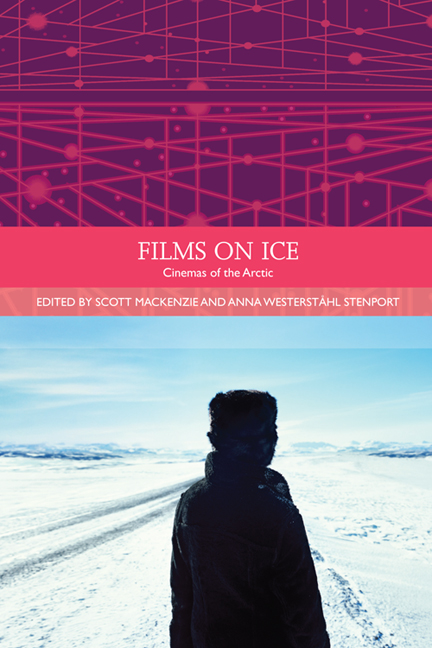Book contents
- Frontmatter
- Contents
- List of Illustrations
- Acknowledgements
- Traditions in World Cinema
- Introduction: What are Arctic Cinemas?
- PART I GLOBAL INDIGENEITY
- PART II HOLLYWOOD HEGEMONY
- PART III ETHNOGRAPHY AND THE DOCUMENTARY DILEMMA
- PART IV MYTHS AND MODES OF EXPLORATION
- 20 The Changing Polar Films: Silent Films from Arctic Exploration 1900–30
- 21 The Attractions of the North: Early Film Expeditions to the Exotic Snowscape
- 22 Frozen in Motion: Ethnographic Representation in Donald B. MacMillan's Arctic Films
- 23 ‘My Heart Beat for the Wilderness’: Isobel Wylie Hutchison, Jenny Gilbertson, Margaret Tait and Other Twentieth-Century Scottish Women Filmmakers
- 24 ‘Here will be a Garden-City’: Soviet Man on an Arctic Construction Site
- 25 Transcending the Sublime: Arctic Creolisation in the Works of Isaac Julien and John Akomfrah
- 26 DJ Spooky and Dziga Vertov: Experimental Cinema Meets Digital Art in Exploring the Polar Regions
- Notes on the Contributors
- Index
24 - ‘Here will be a Garden-City’: Soviet Man on an Arctic Construction Site
from PART IV - MYTHS AND MODES OF EXPLORATION
Published online by Cambridge University Press: 05 September 2016
- Frontmatter
- Contents
- List of Illustrations
- Acknowledgements
- Traditions in World Cinema
- Introduction: What are Arctic Cinemas?
- PART I GLOBAL INDIGENEITY
- PART II HOLLYWOOD HEGEMONY
- PART III ETHNOGRAPHY AND THE DOCUMENTARY DILEMMA
- PART IV MYTHS AND MODES OF EXPLORATION
- 20 The Changing Polar Films: Silent Films from Arctic Exploration 1900–30
- 21 The Attractions of the North: Early Film Expeditions to the Exotic Snowscape
- 22 Frozen in Motion: Ethnographic Representation in Donald B. MacMillan's Arctic Films
- 23 ‘My Heart Beat for the Wilderness’: Isobel Wylie Hutchison, Jenny Gilbertson, Margaret Tait and Other Twentieth-Century Scottish Women Filmmakers
- 24 ‘Here will be a Garden-City’: Soviet Man on an Arctic Construction Site
- 25 Transcending the Sublime: Arctic Creolisation in the Works of Isaac Julien and John Akomfrah
- 26 DJ Spooky and Dziga Vertov: Experimental Cinema Meets Digital Art in Exploring the Polar Regions
- Notes on the Contributors
- Index
Summary
The Soviet Union in the 1970s was marked by colossal construction projects. Among them was the Baikal-Amur Mainline (BAM), ‘the construction project of the century’ in the words of then General Secretary of the Central Committee of the Communist Party of the Soviet Union, Leonid Brezhnev. Built largely in the permafrost area and intended to connect Eastern Siberia with the Russian Far East, this and many similar projects originated in the late 1920s and 1930s. Thus, BAM is part of the Great Northern Route, an uncompleted project of railroads intended to link the Barents Sea with the Strait of Tartary near Sakhalin Island, thus cutting through Eastern Russia. The idea of a second railroad in the Far East was restored in the 1970s in anticipation of new discoveries of natural resources in the Urals. Leonid Brezhnev raised the question of building BAM in March 1974. In April 1974, at the Congress of the All-Union Leninist Young Communist League, known as the Komsomol, BAM had already been declared an intensive (shock-work) Komsomol construction project and a team comprising 600 workers was transported to the site (Parfyonov 2010: 104).
The cinema of the 1970s follows the same logic as the history of great construction projects. Falling back on the history of the 1930s, it develops and transforms the ideas of the early Stalin period. It is no wonder that in search of inspiration, film directors of the 1970s turned to the period of the 1930s and bypassed the Stalin purges. They wanted to extract the pure essence of the great construction projects and plant it in the ground of the ‘developed socialism’ of the 1970s. Yet by then the enthusiasm for building a new life and a new world had already waned.
However, the 1970s attempted to borrow from the previous decades the romanticism of the pathfinders and explorers of uncharted territories, and this resulted in the emergence of a ramblers’ subculture based on romanticising the life of geologists in harsh climatic conditions. The simple life of field geologists in the taiga and high lands, or in permafrost areas, was viewed as free and liberating in contrast to the unnatural and constrained life of people in the cities.
- Type
- Chapter
- Information
- Films on IceCinemas of the Arctic, pp. 310 - 324Publisher: Edinburgh University PressPrint publication year: 2014



